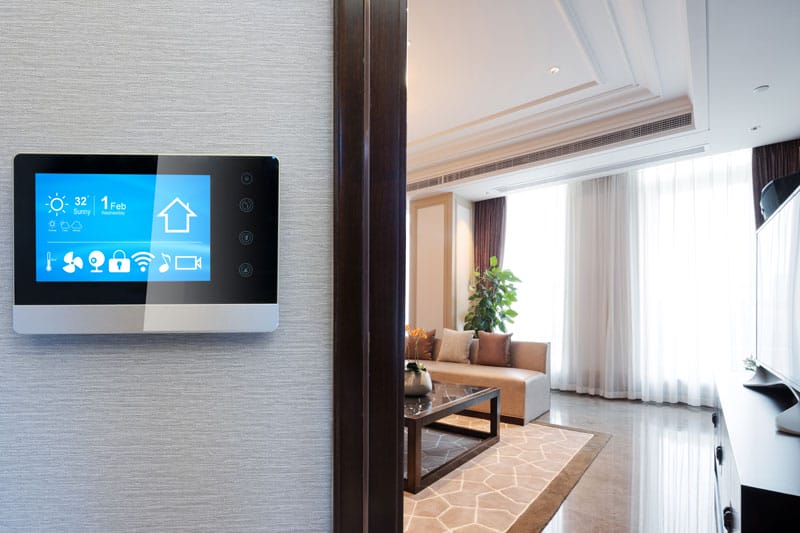Written by Cara Fitzgerald | 24 February 2024
Smart home technology is the new black of real estate selling points. Today’s home buyers are going beyond a wish list of butler’s pantries and kit kat bathroom tiles to wanting to know what your home’s IQ is. This isn’t just a priority of the techie crowd or limited to the more affluent suburbs – digitalisation is continuing to transform our everyday lives, and smart home demand from all buyers is growing common with it.
As a homeowner, you can offer prospective buyers a piece of the future by incorporating a collection of smart home products. Think smart lights, cameras, entertainment systems and appliances, all working together to make your home the brainiest in the street. With plenty of integrated home technologies to choose from, here are a few of the key smart elements that, if done right, could increase your home’s value.
Smart home technologies
Automation
Automation is the choreographed convenience of a smart home that unfolds effortlessly and performs tasks either automatically or based on your command – lights dimming or turning on and off, a thermostat adjusting temperatures based on occupancy or preferences, and curtains opening and closing with the rising and setting of the sun.
Remote control
The systems in your home should be just a click away with the ability to control and monitor smart devices remotely using smartphones, tablets, or computers.
Voice control
Comfortable on the couch and don’t want to get up? No problem, smart homes offer a hands-free approach. Virtual assistants such as Amazon’s Alexa, Apple’s Siri and Google Assistant enable you to dim the lights, change the temperature, play music and unlock the front door – all by voice commands.
Interoperability
It’s essential that your smart products are compatible with each other and can communicate and operate seamlessly. If you have smart lights from one brand and a smart security setup from another, interoperability ensures they can work together within your smart home ecosystem without any conflicts.
Energy efficiency and sustainability
Smart homes often prioritise energy efficiency, and rightly so, as buyers are increasingly drawn to sustainable and energy-efficient homes and appliances. Smart thermostats optimise heating and cooling to the degree, through occupancy sensors and weather forecast integration for example, while smart lighting reduces energy consumption by adjusting brightness based on natural light and occupancy.
Sustainability
Smart home technology not only makes life more convenient; it also offers key sustainability benefits. Some smart products enable home owners to monitor and control their energy and resource usage and, in turn, empowers them to make eco-friendly decisions. By tracking energy and water usage for example, you can work out where to cut back and help the environment.
How many homes are smart?
More than two-thirds (69%) of Australian households are said to have at least one smart home product and about a quarter (26%) of households already have more than five different types of smart home devices installed, according to 2022 research from Australian technology and telecommunications analyst company, Telsyte.
According to Statista, the strongest growing segments of internet connected devices in 2021 were smart security, smart outlets, and smart garden devices.
Does having smart home technology increase my home’s value?
Smart trends are no longer reserved for the most high-value homes, so investing in smart home technology is not something you should keep putting off. Buyers today have a keen eye on the existing smart tech that’s already included in your home, preferencing those with a higher IQ over others.
Smart home technology that incorporates the key smart elements discussed here, can definitely add to your home’s market value. Valuers can make adjustments when they compare tech-enabled homes with similar but tech-deficient houses. Smart homes can command higher prices and may be easier to sell.
However, it’s important that the type and extent of smart home technology does not become an over improvement to your home. For instance, full home automation in a less expensive suburb may be something buyers want but can’t afford. Check out comparable properties in your area and speak with your local real estate agent to understand the right balance of smart home technology for your home, location and market.
Rated the number 1 agency in the suburb 9 years in a row, our team at @ap-realty will provide you personalised advice and help you achieve the best possible price for your home.




